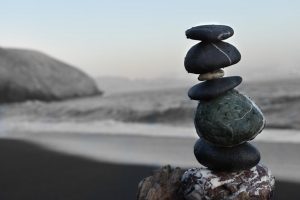In Ayurveda, waking up at 3am means your body is trying to tell you something. This ancient healing practice believes that all your body does, is the result of balance, or imbalance, in your energy. So, what does waking up at 3am mean?
Most of us will have a love-hate relationship with sleep. For some of us, it comes easily as soon as our head hits the pillow! For others? Well, if you manage to get to sleep, you suffer from the inevitable early hours wake up call.
But what can be done? Well, short of trying a night-time drink like Horlicks, it might be worth digging deeper to find the root of your sleep problem. And that’s where Ayurveda comes in!
Horlicks or Ovaltine: Which Is Better for Sleep?
So, what can this traditional practice teach us about our sleep patterns? And what does waking up at 3am mean in Ayurveda?
Let’s find out!

Photo credit: Kinga Cichewicz via Unsplash
Principles of Ayurveda

Photo credit: Colton Sturgeon via Unsplash
If you are familiar with Ayurveda, you will know that the practice is based on the energy balance within our body. This traditional practice originates in India, and is centuries old. But despite its long history, Ayurveda is still an incredibly popular alternative for healing.
Ayurveda works on the principle that 5 elements make up the universe. The elements are Vayu (air), Jala (water), Akash (space), Teja (fire) and Prithvi (earth).
These five elements combine to make three energy sources, or doshas. These three doshas each reflect two of natures elements. Each dosha is present in all of us, and combine to make our personal energy. Although, we usually relate to one dosha more, which is our dominant dosha.
Ayurveda Doshas: Find Out Your Dominant Dosha!
The three doshas are:
Kapha: earth and water
Kapha is associated with cold, heavy, and wet qualities.
Vata: air and space
Vata is associated with cold and light qualities.
Pitta: fire and water
Pitta is associated with hot, light, and oily qualities.
Ayurveda is about keeping each of these doshas balanced to maintain positive health and well being. However, many things can affect the balance of our doshas, including diet, thought patterns, and of course, sleep!
So, how does our dosha balance affect our sleep? And what does it mean to wake up at 3am?
Well, first we need to learn about the Ayurvedic clock!
Ayurvedic Clock
So, we know that our dosha balance can affect our sleep. In fact, sleep is a key factor in keeping balance in our lives, and practicing Ayurveda.
But what else can Ayurveda teach us about our sleep patterns?
Well, in Ayurveda, our day is broken down into six periods. Each period is 4 hours, and dominated by one dosha energy. So, the times we choose to wake, eat, exercise and sleep, are all affected by the dominant energy during that time period! Ayurveda as a practice is all about routine, a way to teach your body and mind discipline whilst keeping your energy balance in check.
Let’s take a closer look at the Ayurvedic clock:
6am – 10am
This is Kapha time; 6am is the best time to get up and take a slow, relaxing start to the day.
10am – 2pm
This is prime Pitta time; you are at your most productive in Pitta’s energy.
2pm – 6pm
Vata time is between these hours, the best time for creative energy to flow.
6pm – 10pm
We’re back to Kapha time again; 6pm is the best time to start slowing down for the day. 10pm is the prime time to go to bed, and get some sleep.
10pm – 2am
Pitta time kicks in again between these hours. Getting rest during these times will allow your Pitta energy to process the days events. This is the time your mind is mentally preparing for the following day.
2am – 6am
Vata’s creativity will give you vivid dreams. Those with insomnia will feel the pull of creativity during this time!
As you can see, the Ayurvedic clock takes our energies in full circle. Whatever we are doing during these time periods is affected by the dominant energy during that time.

Photo credit: Damir Spanic via Unsplash
For example, if you have work to do, you know that Pitta time will be the best energy flow for productivity! Or if you’re a creative type, late afternoon will be when your mind is flowing most freely!
But what does it mean for our sleep? Does the Ayurvedic clock explain why you’re waking up at 3am?
Well, let’s find out!
Ayurveda: Waking Up at 3am
In Ayurveda, frequently waking up at 3am, might indicate a Vata energy imbalance. This is the time when Vata energy is dominant, and can indicate a need for change in your sleeping habits!
So, how can you remedy that? Well, there are many ways to fix a Vata energy imbalance and improve your sleep. The key is to use the Ayurvedic clock to your advantage – to address your Vata imbalance, and work on your other doshas too!
Let’s find out how!
Sleep by 10pm
Ayurveda recommends going to sleep around 10pm, during slow, heavy, Kapha time.
This might sound early. But the theory behind this is that after 10pm, hot, dry, Pitta energy kicks in. As we know, Pitta is great energy for productivity in the day. But at night? Well it can leave your brain spinning, and make falling asleep much harder! Have you ever noticed yourself lying there, waiting to sleep but processing the entire days events? Well, that might be Pitta energy putting off sleep!
So, by 3am, Vata is coming into play, which is when you are feeling creative energy. If you have gone to sleep late, you are likely not going to be in a heavy enough sleep to resist this pull from Vata. Hence, your 3am wake-up call!
Avoid Big Meals at Night
The Ayurvedic eating principles advise to avoid eating a big meal late in the day.
Ayurvedic Eating Principles: What Are They?
Why? Because digestion plays a big part in the balancing of our energies, and in turn our sleep patterns. If your body is trying to digest a big meal late at night, your energy is going to be focused on that. Ideally, between 6pm – 10pm, you want your Kapha energy focused on calming and winding down the mind.
It’s also worth remembering that each dosha has foods to eat, and to avoid. Each dosha has certain foods that can cause an imbalance – so make sure to avoid foods that can imbalance your Vata dosha, such as raisins, radishes and rye!
A big meal at lunchtime – 12pm – gives the Pitta energy time to digest your food. If not, Pitta – which is all about digesting – will be digesting at 2am. Therefore, you are likely to wake up at midnight, because your mind is processing food, rather than doing mental processing!
Of course, there are also foods and drink you can eat during the evening that may even help to induce sleep! This could be a warm glass of milk or even a handful of almonds – honestly!
Find out: The 5 Best Foods to Induce Sleep!
Meditate
Meditation and mindfulness are incredibly important in Ayurveda. Practicing meditation at sunset can help bring your day to a calm close. Especially if this is done during Kapha energy between 6pm – 10pm.

Photo credit: Le Minh Phuong via Unsplash
Meditation brings calm and serenity to the body and mind. This is a perfect, slow end to the day and prepares the body and mind for sleep!
So, now we know! In Ayurveda, waking up at 3am can mean an imbalance in your Vata energy!
Whether you practice Ayurveda or not, paying attention to sleeping pattern is crucial. Many of us neglect our need to sleep, and get by on as little as possible. However, sleep is an important part of staying happy and healthy – along with balancing our doshas!
Of course, there are many different methods you can try to improve sleep – including exercise. Ensuring you are active in the day can lead to a better night’s sleep. This could be yoga, home workouts or even running! In fact, take a look at the five best anaerobic home workouts we’ve put together – these are almost certain to give you a good nights sleep!
5 Best Anaerobic Home Workouts!
Would you try Ayurveda to get a better nights sleep? Tell us in the comments below!


